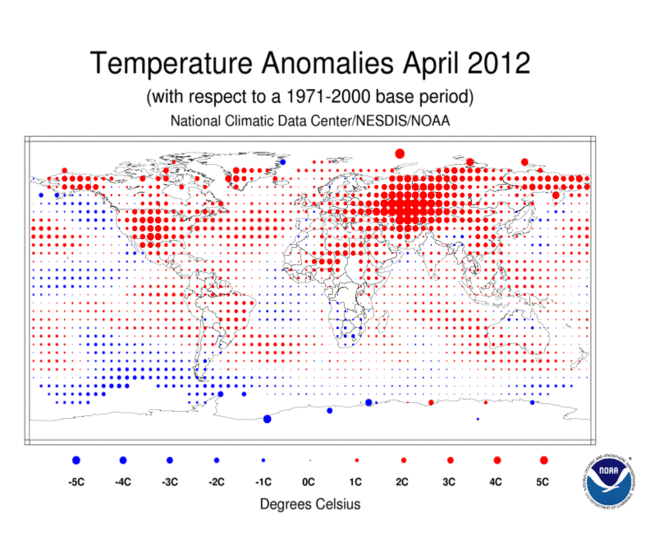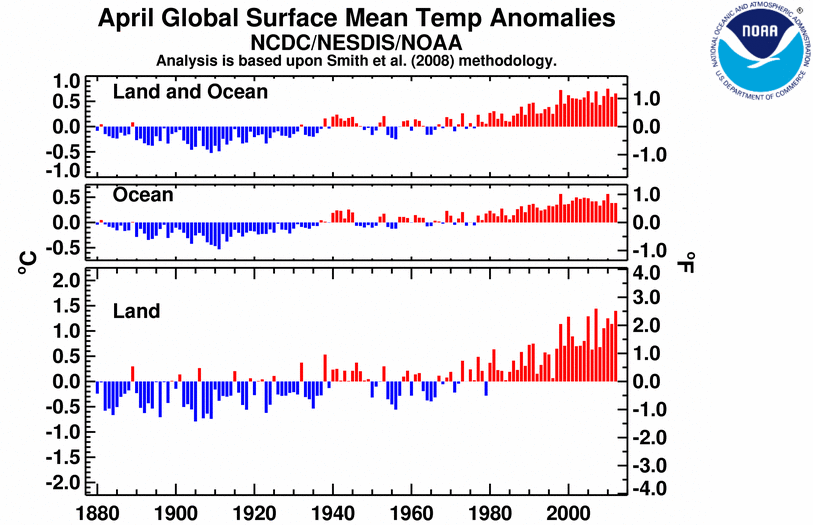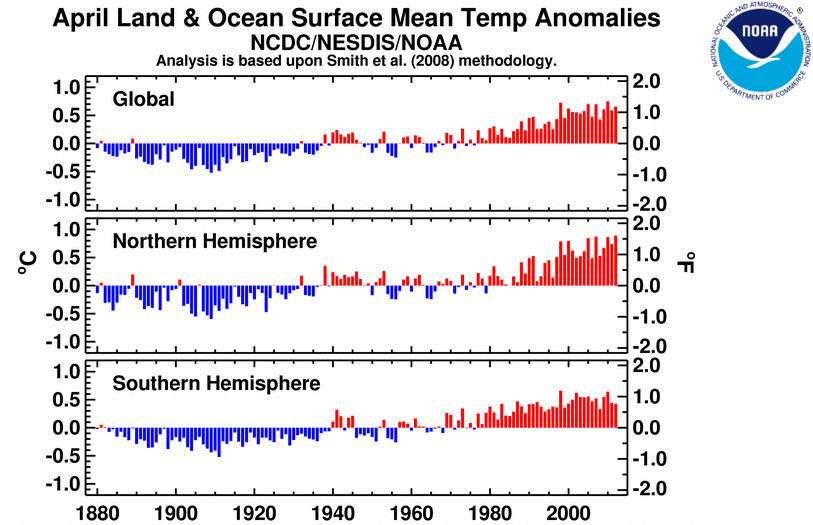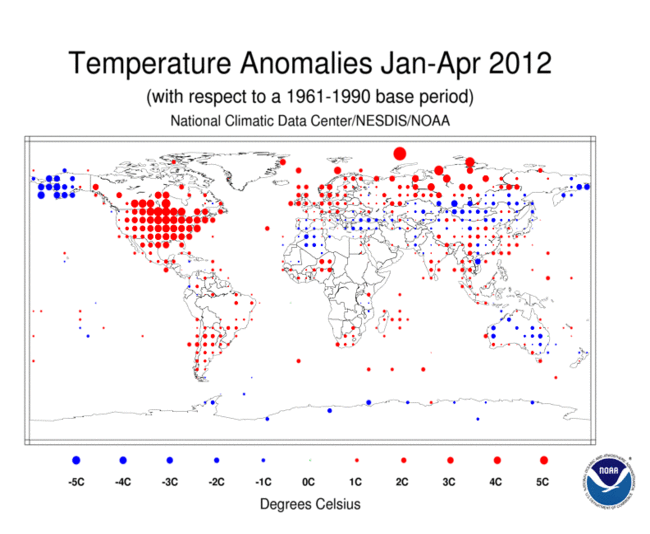An Examination of Reasoning; NCDC: April Global Temperature Anomalies
An Examination of Reasoning
Response to a blog post on Forbes.com to a post by Steve McDonald by Mark Hoofnagle.
NCDC: April Global Temperature Anomalies
Source: https://www.ncdc.noaa.gov/sotc/global/2012/4
Global Highlights
- The combined average temperature over global land and ocean surfaces for April 2012 was 14.35°C (57.87°F), which is 0.65°C (1.17°F) above the 20th century average of 13.7°C (56.7°F). The margin of error associated with this temperature is ±0.08°C (0.14°F). The global temperature departure from the 20th century average and the monthly rank were the highest since November 2010, near the onset of first back-to-back La Niñas in 2010.
- The global land surface temperature was 1.39°C (2.50°F) above the 20th century average of 8.1°C (46.5°F), making this the second warmest April, behind 2007. The margin of error is ±0.11°C (0.20°F).
- For the ocean, the April global sea surface temperature was 0.38°C (0.68°F) above the 20th century average of 16.0°C (60.9°F)—the 11th warmest April on record. The margin of error is ±0.04°C (0.07°F).




January–April 2012 Blended Land and Sea Surface Temperature Anomalies in degrees Celsius
The January–April map of temperature anomalies shows that warmer-than-average temperatures occurred across the contiguous United States, southern Canada, Mexico, southern South America, the United Kingdom, Scandinavia, northern Russia, and parts of southeastern Asia. Cooler-than-average conditions were observed across Alaska, northern Africa, central Asia, eastern Russia, and most of Australia.

@steve mcdonald;
You wrote:
“You are literally describing the mental state of having wholesale ‘bought’ into a dogma. The give away is ‘when in actuality there is none.’ Declaring there is no debate is simply the act of someone who is not willing to debate.”
I think this is a straw man argument, this is not what the definition is meant to mean or how it is applied. There are times when you are dealing with people that are not honest brokers in a debate, or are so ideologically warped they have no capacity to be involved in a meaningful discussion about a topic. We developed this definition after comparing the tactics of denialists like those who deny HIV causes AIDS, those who deny evolution, those who deny germ theory of disease, those who claim vaccines cause autism, those that deny the holocaust etc. In each of this instances, the motivations, ideology, etc., are different, sometimes the motivation might even be seen as positive (protectiveness of one’s own children), but the universal features were a pattern of behavior and debate which is inconsistent with rational discourse. These include wild, non-parsimonious conspiracy theories, cherry-picking of data, the use of fake experts or experts from outside fields as figures of authority, the constant moving of goalposts as proofs are obtained, and general logical fallacies.
These are not appropriate types of arguments and it’s of no value to debate with people that are using them. They are irrational, and when they are being used to sway people it’s appropriate to call out and castigate the tactics themselves, and the users of such tactics as dishonest brokers.
Similarly with global warming the criteria are met. Denialists like Inhofe describe a “global warming hoax” which suggests that thousands of scientists around the world are colluding together to publish false data for either an environmental or world government agenda. This is absurd on it’s face. They cherry pick individual studies and even individual data points to deny the consensus view and frankly distort the actual meaning of data. One denialist, in front of congress, subtracted inconvenient lines from a study to create the appearance models were poor forecasters of the future. They have many bogus experts and lists of scientists that are often just collections of names of meteorologists, MDs, and scientists in other fields but not climate scientists. Goalpost moving is inherent in their behavior as no amount of data or evidence is accepted, they always suggest there is too much uncertainty or it has not been proven in one little detail. Address the detail, no change in opinion. Logical fallacies are abundant, including name-calling, straw men, etc.
It is also hysterical that you cite Michael Crichton as some kind of expert on science. Crichton was a science fiction writer and a bit of a crank. He was not a scientist, and the speech that came from is widely revered by cranks who like to denigrate consensus. Well I am a scientist, and I let me tell you how wrong this statement is. For instance, what do people think professional societies are? Why does the American Thoracic Institute or the American Heart Association release guidelines for things like screening for cancers, treatment guidelines for hypertension, admission guidelines for pneumonia etc? These are consensus guidelines based on the literature and evaluated by consensus committees to create a consensus on appropriate therapies to treat disease. Consensus! It’s abundant, and helpful, and exists throughout different scientific fields to try to identify the consistent truths that filter out of the literature.
Consensus can also greatly advance individual fields. Take for instance the treatment of sepsis in the ICU. Until 1993 when a consensus committee was created on sepsis there wasn’t even a standardized definition of what sepsis is! Within years of this initial consensus conference huge advances were made in studies of sepsis based on universal guidelines defining the disorder.
I hope that addresses some of the confusion about definitions.